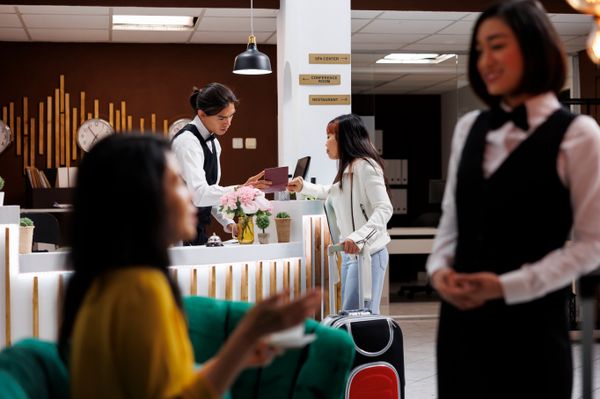For businesses in the tourism industry, staying up to date is the key. Technology is an essential part of the tourism and travel industry as it continues to evolve. Businesses therefore need to position themselves ever more digitally in order to acquire, retain and entertain customers. Two factors that will shape tourism in the coming years are technology and sustainability. In this blog post, NeedNect Solutions presents emerging technology trends in tourism.
Virtual Reality
Virtual reality has conquered the entertainment market in recent years. Innovative hotels have already recognised the technology as one of the most promising tech travel trends. VR (Virtual Reality) allows travellers to digitally enter the virtual environment of a place. It makes it possible, for example, to access destinations that are difficult to reach.
Several hotel chains are already experimenting with this technology. They allow their customers to experience their hotel room during the booking process before they have ever physically been there. Whereas in the past it was professional photos of the accommodation that decided on a booking, in the future it will be virtual tours.
Robots
Increasingly, robots are being used in the tourism industry - from reception to security robots and robotic travel cases. Robots are machines designed to perform specific tasks and processes automatically and accurately. Artificial intelligence (AI) is increasingly being used to perform complex tasks that require human cognitive functions.
Robots have become almost commonplace in the travel industry in recent years, providing text-based customer service and more physical interactions. Without a doubt, robots have certain advantages over human employees:
- more consistency,
- accuracy,
- the ability to work around the clock,
- the ability to work without holidays, breaks or salary...
On the other hand, there are the disadvantages:
- they may take away jobs,
- they can't adapt to unforeseen events,
- they are very expensive to buy,
- longer-term maintenance costs are incurred
Nevertheless, it must be said: robots can never completely replace humans. In a hotel, hospitality and empathy are the focus. Man and machine should complement each other and offer relief for employees. In the future, it could be an additional attraction.

Smart Rooms
Smart room technology is an important trend for hotel owners. This technology is driven by the Internet of Things (IoT). This means that once ordinary devices are now equipped with internet connectivity. This allows data to be sent, received and effectively communicated with each other.
The variations of this technology application are many. In a hotel, it may be a device connected to the lighting, heating and air conditioning systems. Everything is controlled according to the wishes and needs of the guest. This in turn results in cost savings and thus an improved financial situation.
The benefits of smart rooms are more personalisation, improved sustainability and an enhanced customer experience.
Chatbots & Artificial Intelligence
This technology is used by tourism businesses to offer quick response times to basic questions. Opening hours, admission prices, directions and similar standard enquiries can thus be answered 24/7 and within a few seconds. The goal is to solve complex tasks. Through developments in the field of artificial intelligence, chatbots are now much more capable of being an intelligent interface between people, machines, information or services.
The future holds a multitude of new technologies. Those who want to survive in tourism in the long term must be innovative and flexible enough to meet these trends.
The consumers' desire for comfort, adventure and experience will remain. However, smart devices and artificial intelligence are becoming increasingly important. Due to technological changes and improvements, individual needs of guests can be satisfied through unimagined possibilities. Individual experiences will therefore play an even greater role in the future. If the hotel already knows the guest before arrival, customised offers and experiences can be created.







